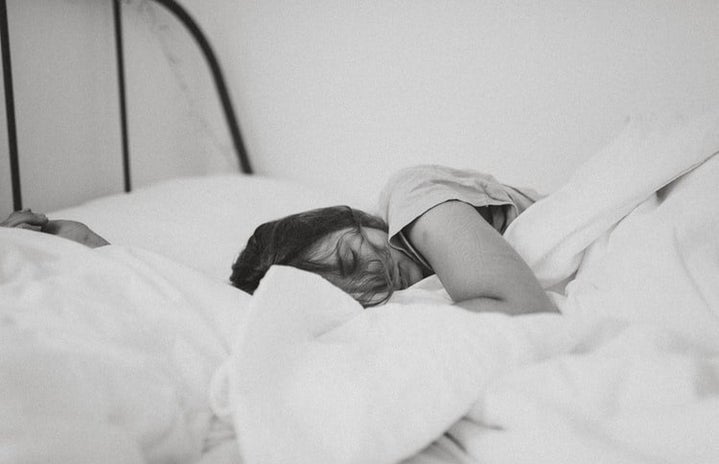Trigger warning: suicide mentions
All I’ve done in the past 7 months is rewatch shows I hate and over pluck my eyebrows. I’ll answer before I’m asked because the truth is no, I’m not fine and I’m far from being the only one given how completely chaotic this year has been. I’m at the stage of quarantine where I consider it a good day if I manage to tidy my bed and water my plants within the same 24 hours. Welcome everyone, we’re starting a new academic year, we’re in the middle of a pandemic, and some of us (me) are struggling.
I don’t have a diagnosed condition. I want to put that there as a disclaimer so it’s made aware that I am by no means a professional or someone who really knows what they’re doing. However, the World Health Organisation estimates that there are more than 264 million people of all ages who suffer from depression and what’s more, between 76% and 85% of people in low to middle-income countries receive no treatment for this disorder. As such, it is important that we learn to recognise symptoms of mental disorders in ourselves and others so we can seek and advocate for more effective and accessible treatment for us all.
Given the recent de-stigmatisation of depression on social media, many more people are aware of the symptoms that typically characterise this disorder; persistent and long-term low moods coupled with feelings of anxiety, hopelessness, and a general lack of interest in life. These all often lead to physical symptoms too—changes to appetite and sleeping patterns, body aches and fatigue, and a myriad of other side effects further explained on the NHS website. Each person has different experiences and the bad days are not always constant, often depressive episodes (a period longer than 2 weeks in which the aforementioned symptoms are exhibited) are cyclical and can arrive right after some really good days. While this article does not aim to be a guide, I hope to offer some steps that have helped me move on from the bad times.
Digital
The joy of deleting. You know that feeling of clicking off the dozens of tabs you had open to write an essay? Reward yourself with that joy by clearing out your browsers, photos (use Google photos to save storage), unused apps, texts (no need to reply all at once—it’s okay. Just start off with 1 or 2 people and work through them in between other tasks/over a period of time), and finally emails—when you have enough energy to reply to them, use the app Spark to help you cut down the thousands of unread emails. No judgement!
Also, try deactivating your accounts to refresh your system. Social media is so overwhelming, we were not made to consume so much devastation at such a heightened scale and it can easily affect our patterns of thinking without us even realising. I really recommend ‘Digital Minimalism’ by Cal Newport for anyone unsure of how they can balance social media in their daily life. If deactivating is too big a step, try deleting the apps off your phone so you find yourself less inclined to scroll meaninglessly through your feed. Having to load your page on a browser requires much more activity—maybe laziness can save you here.
At home
Here are some things I like to do to make myself feel more human. Feel free to choose as many or as little tasks to complete. Take your time working through them:
~ Take your vitamins and medication
~ Drink a bottle of water. Then drink another one
~ Eat something. It doesn’t have to be ‘good for you’—just get some energy into your system
~ Tidy your bed and change your sheets
~ Open a window and/or blinds to let light in
~ Brush your teeth or try to at least use mouthwash
~ Change your clothes and underwear
~ Throw water on your face or just use wet wipes
~ Shower if you are able to and if not, use a wet cloth on your armpits and feet
~ Spray some perfume or burn some incense. Fill your room with calming smells
~ Put on a piece of jewellery that makes you happy
~ Change your hairstyle. Tie it up, take it down, try not to dye or shave it impulsively
~ Water plants / feed pets / look after life around you
~ Put dirty clothes in a laundry bin. Wash multiple loads at once with a colour catcher
~ Wash your masks if they’re reusable
~ Load the dishwasher or put dirty dishes in the sink. Put on a playlist or podcast and wash away
~ Pick up items from the floor
~ Vacuum the floor
~ Throw out the garbage (good way of getting some air so congrats—you’re multitasking!)
Outside
Try your best to step outside, unless you’re quarantining, in which case I recommend listening to nature landscapes at home. It doesn’t have to be anything big; go collect the mail, walk around the neighbourhood, sit on a bench, do some grocery shopping… try to find some comfort outside of the little cocoon you built for yourself in bed. Make sure to wear your mask and socially distance though!
For the future
Try to track your emotions, perhaps with a journal so you’re better prepared for the next episode that may hit. Try to reach out to a GP or mental health professional to receive further support and treatment (helplines will be listed below). Explain your experience to people you trust so that you have a support system that is understanding of why you may isolate yourself in the future. Keep a little bag of items next to your bed with necessities like tissues, wipes, snacks, and a water bottle for the really bad days. Write drafts to send to your professors in case you need an extension on a deadline or to explain any late submissions. If you feel the urge to self harm, try methods like holding ice cubes, tearing paper, punching a pillow or drawing on your skin with red pen to ease that feeling.
Again, I am not offering a solution with this article. After writing this, I may just crawl back into bed with the cup of chai I made (and forgot to drink) and look ahead to the gloomy winter that awaits me. Yet, there is some small comfort in knowing that especially in our current circumstances, I am not the only miserable person here.
Sometimes I look at the big tree outside my window and think “Wow, what a cool tree” and that is my only peaceful thought for the day. Other days it gets darker. But progress is not linear and is not always about moving in a forward direction. It’s the sigh before we get up to open a window or the small joy of watching a sunrise or the satisfying crackle of a brand-new book. It is the cheesy (so cheesy) bits of happiness we come across in our everyday lives that push us to wake up another day and have at it. Fight your demons. Lose sometimes. But pick yourself up and try again. You deserve to.
If you are having thoughts of suicide, please call 0800 068 4141 or text 07860039967 for confidential support from HOPELINEUK.
If you have depression or any other mental health issue and need further support, please reach out to Samaritans via 116 123 (they have a free 24-hour helpline).



